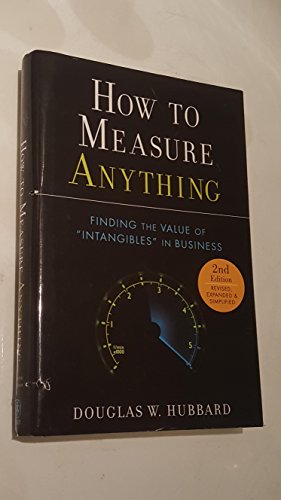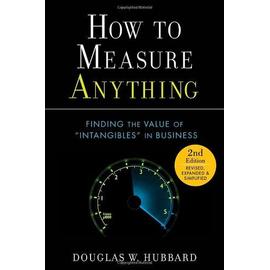
How to Measure Anything : Finding the Value of Intangibles in Business by Douglas W. Hubbard - used book
ISBN: 9780470539392
Now updated with new research and even more intuitive explanations, a demystifying explanation of how managers can inform themselves to make less risky, more profitable business decisions… More...
| BetterWorldBooks.com used in stock. Shipping costs:zzgl. Versandkosten., plus shipping costs Details... |

2010, ISBN: 0470539399
[EAN: 9780470539392], [PU: John Wiley and Sons], **Simply Brit** Shipped with Premium postal service within 24 hours from the UK with impressive delivery time. We have dispatched from our… More...
| AbeBooks.de Brit Books, Milton Keynes, United Kingdom [54148132] [Rating: 5 (von 5)] Shipping costs: EUR 10.19 Details... |

ISBN: 9780470539392
Wiley. Used - Good. Good condition. Like New dust jacket. 2nd edition. A copy that has been read but remains intact. May contain markings such as bookplates, stamps, limited notes and h… More...
| Biblio.co.uk |

2010, ISBN: 0470539399
[EAN: 9780470539392], Gebraucht, guter Zustand, [PU: Wiley], Buy with confidence! Book is in good condition with minor wear to the pages, binding, and minor marks within, Books
| AbeBooks.de Books Unplugged, Amherst, NY, U.S.A. [74050220] [Rating: 5 (von 5)] NOT NEW BOOK. Shipping costs: EUR 45.83 Details... |

| Rakuten.fr |


How to Measure Anything : Finding the Value of Intangibles in Business by Douglas W. Hubbard - used book
ISBN: 9780470539392
Now updated with new research and even more intuitive explanations, a demystifying explanation of how managers can inform themselves to make less risky, more profitable business decisions… More...

Hubbard, Douglas W.:
How to Measure Anything: Finding the Value of Intangibles in Business - hardcover2010, ISBN: 0470539399
[EAN: 9780470539392], [PU: John Wiley and Sons], **Simply Brit** Shipped with Premium postal service within 24 hours from the UK with impressive delivery time. We have dispatched from our… More...
ISBN: 9780470539392
Wiley. Used - Good. Good condition. Like New dust jacket. 2nd edition. A copy that has been read but remains intact. May contain markings such as bookplates, stamps, limited notes and h… More...

2010, ISBN: 0470539399
[EAN: 9780470539392], Gebraucht, guter Zustand, [PU: Wiley], Buy with confidence! Book is in good condition with minor wear to the pages, binding, and minor marks within, Books

ISBN: 9780470539392
Livre, [PU: Wiley]
Bibliographic data of the best matching book
| Author: | |
| Title: | |
| ISBN: |
Details of the book - How to Measure Anything: Finding the Value of Intangibles in Business
EAN (ISBN-13): 9780470539392
ISBN (ISBN-10): 0470539399
Hardcover
Publishing year: 2010
Publisher: John Wiley & Sons
320 Pages
Weight: 0,509 kg
Language: eng/Englisch
Book in our database since 2007-04-13T07:59:25-04:00 (New York)
Detail page last modified on 2023-07-21T00:56:57-04:00 (New York)
ISBN/EAN: 9780470539392
ISBN - alternate spelling:
0-470-53939-9, 978-0-470-53939-2
Alternate spelling and related search-keywords:
Book author: douglas, john hubbard, ron hubbard
Book title: value, how measure anything
Information from Publisher
Author: Douglas W. Hubbard
Title: How to Measure Anything - Finding the Value of Intangibles in Business
Publisher: John Wiley & Sons
Publishing year: 2010-05-14
Weight: 0,501 kg
Language: English
43,90 € (DE)
Not available (reason unspecified)
BB; GB; Hardcover, Softcover / Wirtschaft/Betriebswirtschaft; Betriebswirtschaft und Management; Wirtschaft
Foreword. Preface. Acknowledgments. Section One: Measurement: The Solution Exists. Chapter 1: Intangibles and the Challenge. Yes, I Mean Anything. The Proposal. Chapter 2: An Intuitive Measurement Habit: Eratosthenes, Enrico, & Emily. How an Ancient Greek Measured the Size of Earth. Estimating: Be Like Fermi. Experiments: Not Just for Adults. Notes on What to Learn from Eratosthenes, Enrico, & Emily. Chapter 3: The Illusion of Intangibles: Why Immeasurables Aren't. The Concept of Measurement. The Object of Measurement. The Methods of Measurement. Economic Objections to Measurement. The Broader Objection to the Usefulness of "Statistics". Ethical Objections to Measurement. Toward a Universal Approach to Measurement. Section Two:Before You Measure. Chapter 4: Clarifying the Measurement Problem. Getting the Language Right: What "Uncertainty" and "Risk" Really Mean. Examples of Clarification: Lessons for Business from, of All Places, Government. Chapter 5: Calibrated Estimates: How Much Do You Know Now? Calibration Exercise. Further Improvements on Calibration. Conceptual Obstacles to Calibration. The Effects of Calibration. Chapter 6: Measuring Risk through Modeling. How Not to Measure Risk. Real Risk Analysis: The Monte Carlo. An Example of the Monte Carlo Method and Risk. Tools and Other Resources for Monte Carlo Simulations. The Risk Paradox and the Need for Better Risk Analysis. Chapter 7: Measuring the Value of Information. The Chance of Being Wrong and the Cost of Being Wrong: Expected Opportunity Loss. The Value of Information for Ranges. The Imperfect World: The Value of Partial Uncertainty Reduction. The Epiphany Equation: How the Value of Information Changes Everything. Summarizing Uncertainty, Risk, and Information Value: The First Measurements. Section Three: Measurement Methods. Chapter 8: The Transition: From What to Measure to How to Measure. Tools of Observation: Introduction to the Instrument of Measurement Decomposition. Secondary Research: Assuming You Weren't the First to Measure It. The Basic Methods of Observation: If One Doesn't Work, Try the Next. Measure Just Enough. Consider the Error. Choose and Design the Instrument. Chapter 9: Sampling Reality: How Observing Some Things Tells Us about All Things. Building an Intuition for Random Sampling: The Jelly Bean Example. A Little about Little Samples: A Beer Brewer's Approach. Statistical Significance: A Matter of Degree. When Outliers Matter Most. The Easiest Sample Statistics Ever. A Biased Sample of Sampling Methods. Measure to the Threshold. Experiment. Seeing Relationships in the Data: An Introduction to Regression Modeling. Chapter 10: Bayes: Adding to What You Know Now. Simple Bayesian Statistics. Using Your Natural Bayesian Instinct. Heterogeneous Benchmarking: A "Brand Damage" Application. Bayesian Inversion for Ranges: An Overview. Bayesian Inversion for Ranges: The Details. Section Four: Beyond the Basics. Chapter 11: Preference and Attitudes: The Softer Side of Measurement. Observing Opinions, Values, and the Pursuit of Happiness. A Willingness to Pay: Measuring Value via Trade-offs. Putting It All on the Line: Quantifying Risk Tolerance. Quantifying Subjective Trade-offs: Dealing with Multiple Conflicting Preferences. Keeping the Big Picture in Mind: Profit Maximization versus Subjective Trade-offs. Chapter 12: The Ultimate Measurement Instrument: Human Judges. Homo Absurdus: The Weird Reasons behind Our Decisions. Getting Organized: A Performance Evaluation Example. Surprisingly Simple Linear Models. How to Standardize Any Evaluation: Rasch Models. Removing Human Inconsistency: The Lens Model. Panacea or Placebo?: Questionable Methods of Measurement. Comparing the Methods. Chapter 13: New Measurement Instruments for Management. The Twenty-First-Century Tracker: Keeping Tabs with Technology. Measuring the World: The Internet as an Instrument. Prediction Markets: A Dynamic Aggregation of Opinions. Chapter 14: A Universal Measurement Method: Applied Information Economics. Bringing the Pieces Together. Case: The Value of the System That Monitors Your Drinking Water. Case: Forecasting Fuel for the Marine Corps. Ideas for Getting Started: A Few Final Examples. Summarizing the Philosophy. Appendix: Calibration Tests (and their answers). Answers to Calibration Questions in Chapter 5. Additional Calibration Tests. Index.More/other books that might be very similar to this book
Latest similar book:
8580001070766 How to Measure Anything: Finding the Value of Intangibles in Business (Douglas W. Hubbard)
- 8580001070766 How to Measure Anything: Finding the Value of Intangibles in Business (Douglas W. Hubbard)
- 2900470539391 How to Measure Anything: Finding the Value of Intangibles in Business (Douglas W. Hubbard)
- 2901118539278 How to Measure Anything: Finding the Value of Intangibles in Business (Douglas W. Hubbard)
- 9780470625699 How to Measure Anything (Hubbard, Douglas W.)
- 9780470625675 How to Measure Anything (Hubbard, Douglas W.)
< to archive...

